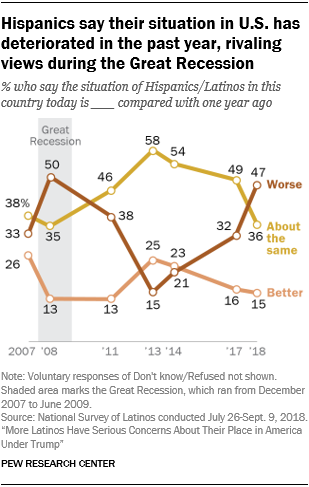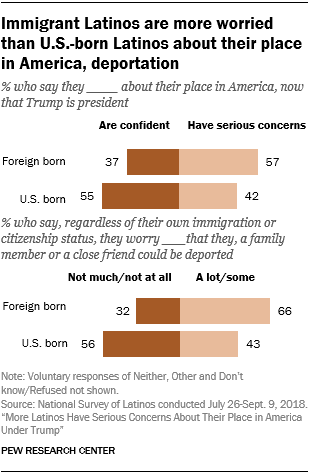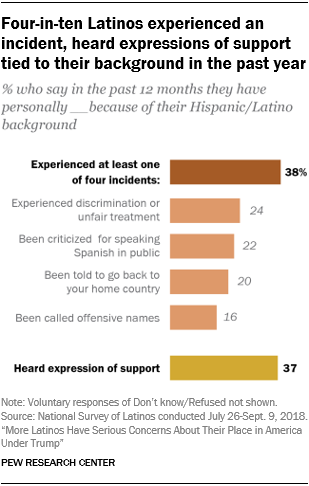 Half of Latinos say their situation in the U.S. has worsened over the past year, up from 32% in the weeks after Donald Trump won the 2016 presidential election and the highest level since the Great Recession.1 In addition, more say they have serious concerns about their place in American society now (49%) than in 2017 (41%). And a majority (55%) say they are worried that they, a family member or close friend could be deported.
Half of Latinos say their situation in the U.S. has worsened over the past year, up from 32% in the weeks after Donald Trump won the 2016 presidential election and the highest level since the Great Recession.1 In addition, more say they have serious concerns about their place in American society now (49%) than in 2017 (41%). And a majority (55%) say they are worried that they, a family member or close friend could be deported.
Many blame the current administration for what they see as the worsening situation of Hispanics, the nation’s largest minority group. Two-thirds (67%) say the administration’s policies have been harmful to Hispanics – a much higher share than during the administration of either Democrat Barack Obama (15% in 2010) or Republican George W. Bush (41% in 2007).2 Overall, six-in-ten Hispanics (62%) say they are dissatisfied with the way things are going in the country today, up since 2017 and the highest level since the Great Recession a decade ago, when 70% of Hispanics said they were dissatisfied with the nation’s direction.
 And yet, attitudes among Latinos are not monolithic. Slightly less than a quarter of Latinos (23%) identify as Republican or describe themselves as leaning Republican. Among this group, six-in-ten (59%) approve of President Trump’s job performance, compared with just 8% of Latino Democrats who say the same.3 In addition, half as many Latino Republicans as Latino Democrats (28% vs. 57%) say the Hispanic population’s situation has grown worse over the past year.
And yet, attitudes among Latinos are not monolithic. Slightly less than a quarter of Latinos (23%) identify as Republican or describe themselves as leaning Republican. Among this group, six-in-ten (59%) approve of President Trump’s job performance, compared with just 8% of Latino Democrats who say the same.3 In addition, half as many Latino Republicans as Latino Democrats (28% vs. 57%) say the Hispanic population’s situation has grown worse over the past year.
Notably, partisan differences do not extend to voting. In each partisan camp, about six-in-ten (59%) registered voters say they are more enthusiastic about voting in the upcoming midterms than in the last congressional elections. This year, more than 29 million Latinos are eligible to vote, up from 25 million in 2014.
Half of Hispanic adults (49%) are foreign born, and as a group they have stronger concern than those born in the U.S. Immigrants are more likely than U.S.-born Hispanics to say they have serious concerns about their place in U.S. society (57% vs. 42%), and they worry a lot or some about deportation (66% vs. 43%). Foreign-born Hispanics are also more pronounced in their criticism of the Trump administration: 71% say White House policies have been harmful to Hispanics as a group, compared with 63% of U.S.-born Hispanics who say the same.
These are among the key findings from a new nationally representative, bilingual telephone survey of 1,501 Hispanic adults, conducted by cellular and landline telephone from July 26 to Sept. 9, 2018, by SSRS for Pew Research Center. The survey’s margin of error for the full sample is plus or minus 3.1 percentage points at the 95% confidence interval.
Latinos’ downbeat assessments extend to their own economic situations. Asked about their personal finances, only a third rate their situation as excellent or good, down from 40% who said the same in 2015. And when it comes to the next generation, the share who say their children will be better off financially than they are has declined from 72% to 54% over the same three-year period. These signs of waning economic confidence contrast with government data showing Latino unemployment at historic lows and Latino household incomes increasing faster than for other groups.
 Beyond economic considerations, a majority (54%) of Hispanics say it has become more difficult in recent years to be Hispanic in the U.S. This feeling is even more pervasive among foreign-born Hispanics (64%) than among the U.S. born (44%). And nearly four-in-ten Hispanics say they have experienced at least one of four offensive incidents in the past year because of their Hispanic background, although about as many note that someone has expressed support for them because they are Hispanic. For the 38% of Hispanics who say they have experienced an incident, these comprise: experiencing discrimination or unfair treatment because of their Hispanic background, being criticized for speaking Spanish in public, being told to go back to their home country, or being called offensive names. Immigrant Hispanics are more likely than U.S.-born Hispanics to report they have experienced most of these incidents.
Beyond economic considerations, a majority (54%) of Hispanics say it has become more difficult in recent years to be Hispanic in the U.S. This feeling is even more pervasive among foreign-born Hispanics (64%) than among the U.S. born (44%). And nearly four-in-ten Hispanics say they have experienced at least one of four offensive incidents in the past year because of their Hispanic background, although about as many note that someone has expressed support for them because they are Hispanic. For the 38% of Hispanics who say they have experienced an incident, these comprise: experiencing discrimination or unfair treatment because of their Hispanic background, being criticized for speaking Spanish in public, being told to go back to their home country, or being called offensive names. Immigrant Hispanics are more likely than U.S.-born Hispanics to report they have experienced most of these incidents.
Individual experiences of discrimination notwithstanding, the survey finds Hispanics are overwhelmingly proud of their heritage (97%). Strong majorities also express pride in being American (84%). Asked if they could do it again today, 70% of Hispanics born in another country or in Puerto Rico said that they would migrate, or leave Puerto Rico, for the U.S. They also continue to see the U.S. as a better place to get ahead (85%) and a better place to raise children (73%) than their countries of origin or Puerto Rico.
The nation’s Latino population stands at nearly 59 million and is one of the youngest and fastest-growing groups in the U.S. Its composition is also changing as the foreign-born share has fallen and U.S. births now drive growth. Overall about one-third of all Latinos are foreign born. Among the about 19 million Latino immigrants, some 8 million are unauthorized immigrants.
The terms Hispanic and Latino are used interchangeably in this report.
U.S. born refers to persons born in the 50 states or the District of Columbia, Puerto Rico or other U.S. territories, and those born elsewhere to at least one parent who was a U.S. citizen.
Foreign born refers to persons born outside of the 50 states, the District of Columbia, Puerto Rico, or other U.S. territories to parents who were not U.S. citizens. The following terms are used to describe immigrants and their status in the U.S. In some cases, they differ from official government definitions because of limitations in the available survey data.
- Foreign-born U.S. citizens refers to persons who indicate they are foreign born and who say they are U.S. citizens. The terms “foreign-born U.S. citizens” and “naturalized U.S. citizens” are used interchangeably in this report.
- Foreign-born lawful permanent residents refers to persons who indicate they are foreign born and who say they have a green card or have been approved for one.
- Foreign born who are not lawful permanent residents and not U.S. citizens refers to persons who indicate they are foreign born and who say they do not have a green card and have not been approved for one.
First generation refers to foreign-born people. The terms “foreign born,” “first generation” and “immigrant” are used interchangeably in this report. Second generation refers to people born in the 50 states, the District of Columbia, Puerto Rico or other U.S. territories, with at least one first-generation, or immigrant, parent. Third and higher generation refers to people born in the 50 states, the District of Columbia, Puerto Rico or other U.S. territories with both parents born in the 50 states, the District of Columbia, Puerto Rico or other U.S. territories.
Language dominance is a composite measure based on self-described assessments of speaking and reading abilities. Spanish-dominant people are more proficient in Spanish than in English (i.e., they speak and read Spanish “very well” or “pretty well” but rate their English-speaking and reading ability lower). Bilingual refers to people who are proficient in both English and Spanish. English-dominant people are more proficient in English than in Spanish.
Hispanic Republicans and Hispanic Democrats refers to those who identify as or lean toward one of the two major political parties.
Eligible voters or the voting eligible population are persons ages 18 and older who are U.S. citizens.


 Learn more about U.S. immigration
Learn more about U.S. immigration